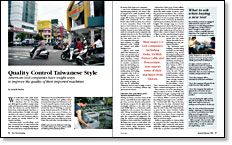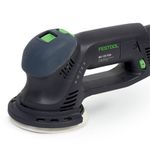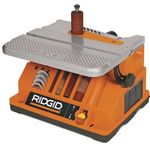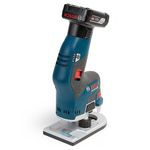Quality Control Taiwanese Style
American tool companies have sought ways to improve the quality of their imported machines
Synopsis: Options for light- and medium-duty tools, such as contractor’s tablesaws, miter saws, and benchtop planers, are mostly limited to Taiwanese machines. Fine Woodworking’s Anatole Burkin visited 16 woodworking machinery factories in Taiwan to see how modernized manufacturing methods and quality-control measures have improved Taiwanese tools. The country’s low-cost labor pool attracts manufacturers; more of the factories are turning to automation, but many tasks are still hands-on. Inspectors spend a lot of time overseeing product quality. And China, where labor is even less expensive, is exporting more woodworking tools all the time. Burkin includes a checklist of what to ask when buying a new tool to ensure you get the quality you’re after.
From Fine Woodworking #128
Woodworkers who pride themselves on owning nothing but American iron are becoming rare. Although it’s possible to equip a shop solely with American-made woodworking tools, the choices are mostly limited to heavy-duty, industrial-grade machines or older, used machines. For light- and medium-duty tools, such as contractor’s tablesaws, miter saws and benchtop planers, the options are mostly limited to Taiwanese machines.
Taiwanese-made woodworking tools have occasioned lots of controversy in the past. But things are changing. Representatives from American companies that import Taiwanese tools say modernization of manufacturing methods and quality-control measures have improved Taiwanese tools.
To see for myself, I spent a week touring 16 woodworking machinery factories in and around the city of Taichung, a crowded, smog-choked metropolis of 700,000. The city is on the west coast of Taiwan, two hours south of the capital Taipei. I visited factories that make tablesaws, jointers, planers, miter saws, dust collectors, motors, router bits and other woodworking tools for many of the major tool companies.
I saw both old-fashioned and modern manufacturing methods. The shops I visited ranged from small operations with a handful of employees to factories with nearly 200 workers. Some plants I visited build tools exclusively for one name brand; others build machines for a dozen or more companies. Many of the wellknown North American tool companies have some connection to Taiwan. Delta, DeWalt, General, Porter-Cable and Powermatic are among the many companies that maintain factories in the West and import products from Taiwan.
I also visited factories that make tools for U.S. companies whose primary business is selling imported tools: Grizzly, Jet, Sunhill and Wilke (Bridgewood). I gained some confidence that Taiwanese factories can produce good tools. To help ensure that, many American companies send their inspectors to monitor production. But I also left feeling confused by the labyrinthian network of suppliers, assembly plants and trading companies that work together, sometimes producing what look to be nearly identical tools under a variety of names. Labels can be misleading. Ultimately, the best way to judge a tool is to test it in the workshop without any preconceived notions.
For the full article, download the PDF below.
Fine Woodworking Recommended Products

Festool Rotex FEQ-Plus Random Orbital Sander

Ridgid EB4424 Oscillating Spindle/Belt Sander

Bosch 12V Trim Router





















Log in or create an account to post a comment.
Sign up Log in